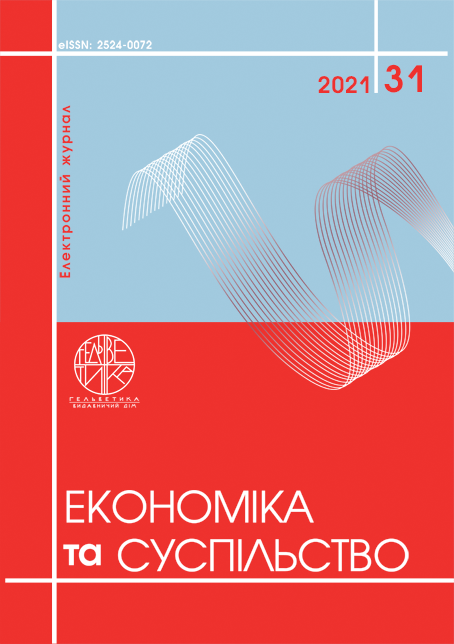DIRECT MARKETING AS AN INTERACTIVE MARKETING SYSTEM FOR THE DISTRIBUTION OF TOURIST SERVICES
Abstract
Direct marketing involves the distribution of products, information and advertising benefits for customers through interactive work (communication). The reason for the popularity of direct marketing is in technical advances, such as customer relationship management and Internet marketing that allow direct contact with target consumers. The aim of the article was to substantiate the technique of direct marketing as an interactive marketing system for the distribution of tourist services in order to increase the competitiveness of tourism. Direct marketing is characterized by high accuracy in obtaining quick and direct consumer responses, and easy measurement of marketing results. Direct marketing is based on databases and lists of potential customers (users) of services, is becoming increasingly available to marketers. To assess the state of tourism in Ukraine and further to characterize the direct marketing as an interactive marketing system for the distribution of tourism services it was analyzed the dynamics of tourism flows in Ukraine. During 2015-2019, the number of tourists served by tour operators, travel agents increased by 4 million people. The number of foreign tourists visiting Ukraine increased by almost 72,000, and the number of tourists traveling abroad increased by 3.9 million. Domestic flows of tourists also show stable growth dynamics during the study period (2015-2019). In the article there are identified the advantages and disadvantages of direct marketing as an interactive marketing system for the distribution of tourist services. Sustainable market competitiveness of the tourism industry requires a balance of growth orientation and commitment to the environment with an acceptable rate of return for all industry partners involved in destination marketing. Any changes in the distribution systems of tourism can be stimulated by external macro-factors, such as politics and trade, the global and national economy, technological innovation and access to them. In the near future, the tourism market will definitely introduce new technologies and opportunities; as many venture capital firms invest more and more in innovation.
References
Державний сайт статистики України. URL: http://www.ukrstat.gov.ua/
Blerim, K. (2012). The marketing of the craft products in Albania, The effects of web Marketing. European Scientific Journal, 8(3). URL: https://eujournal.org/index.php/esj/article/view/52
Holleran, M. (2020). Tourism, Urbanization, and the Evolving Periphery of the European Union. Palgrave Pivot, Singapore. DOI: https://doi.org/10.1007/978-981-15-0218-7
Polyakov, M. Bilozubenko, V. Nebaba, N. Korneyev M. and Saihak Y. (2020). Analysis of asymmetry factors in the development of the EU tourism industry. Innovative Marketing , 16(4), 117–128. DOI: https://doi.org/10.21511/im.16(4).2020.10
Royle, J., & Laing, A. (2014). The digital marketing skills gap: Developing a Digital Marketer Model for the communication industries. International Journal of Information Management, 34(2), 65–73. DOI: https://doi.org/10.1016/j.ijinfomgt.2013.11.008
Sushchenko O. and Ekouaghe M. (2019). Trends in the development of marketing technologies in the tourism market. Economics of Development, 18(1), 9–22. DOI: https://doi.org/10.21511/ed.18(1).2019.02
Ungerman, O., Dedkova, J., & Gurinova, K. (2018). The impact of marketing innovation on the competitiveness of enterprises in the context of Industry 4.0. Journal of Competitiveness, 10(2), 132–148. DOI: https://doi.org/10.7441/joc.2018.02.09
Vaculčikova, Z. Tučkova and Xuan Thanh Nguyen (2020). Digital marketing access as a source of competitiveness in traditional Vietnamese handicraft villages. Innovative Marketing, 16(1), 1–10. DOI: https://doi.org/10.21511/im.16(1).2020.01
WTTC (2019), "Travel & Tourism continues strong growth above global GDP (press release WTTC)", URL: https://www.wttc.org/about/mediacentre/press-releases/press-releases/2019/travel-tourism-continues-stronggrowth-above-global-gdp
Bezuhla L., Demchuk N. (2019) Development strategy of ecoturism enterprises as a factor of increasing their competitiveness. Organizational-economic mechanism of management innovative development of economic entities: Collective monograph / edited by M. Bezpartochnyi, in 3 Vol. / Higher School of Social and Economic. Przewosk: WSSG. Vol. 2. Р. 289–297.
Безугла Л.С. Соціально-економічні функції держави щодо розвитку малого та середнього підприємництва в Україні. Державне управління: удосконалення та розвиток. 2011. № 2. URL: http://nbuv.gov.ua/UJRN/Duur_2011_2_5
Official website of the State Statistics Committee. Retrieved from: www.ukrstat.gov.ua
Blerim, K. (2012). The marketing of the craft products in Albania, The effects of web Marketing. European Scientific Journal, 8(3). Retrieved from: https://eujournal.org/index.php/esj/article/view/52
Holleran, M. (2020). Tourism, Urbanization, and the Evolving Periphery of the European Union. Palgrave Pivot, Singapore. DOI: https://doi.org/10.1007/978-981-15-0218-7
Polyakov, M. Bilozubenko, V. Nebaba, N. Korneyev M. and Saihak Y. (2020). Analysis of asymmetry factors in the development of the EU tourism industry. Innovative Marketing, 16(4), 117–128. DOI: https://doi.org/10.21511/im.16(4).2020.10
Royle, J., & Laing, A. (2014). The digital marketing skills gap: Developing a Digital Marketer Model for the communication industries. International Journal of Information Management, 34(2), 65–73. DOI: https://doi.org/10.1016/j.ijinfomgt.2013.11.008
Sushchenko O. and Ekouaghe M. (2019). Trends in the development of marketing technologies in the tourism market. Economics of Development, 18(1), 9–22. DOI: https://doi.org/10.21511/ed.18(1).2019.02
Ungerman, O., Dedkova, J., & Gurinova, K. (2018). The impact of marketing innovation on the competitiveness of enterprises in the context of Industry 4.0. Journal of Competitiveness, 10(2), 132–148. DOI: https://doi.org/10.7441/joc.2018.02.09
Vaculčikova, Z. Tučkova and Xuan Thanh Nguyen (2020). Digital marketing access as a source of competitiveness in traditional Vietnamese handicraft villages. Innovative Marketing, 16(1), 1–10. DOI: https://doi.org/10.21511/im.16(1).2020.01
WTTC (2019), "Travel & Tourism continues strong growth above global GDP (press release WTTC)". Retrieved from: https://www.wttc.org/about/mediacentre/press-releases/press-releases/2019/travel-tourism-continues-stronggrowth-above-global-gdp
Bezuhla L., Demchuk N. (2019) Development strategy of ecoturism enterprises as a factor of increasing their competitiveness. Organizational-economic mechanism of management innovative development of economic entities: Collective monograph / edited by M. Bezpartochnyi, in 3 Vol. / Higher School of Social and Economic. Przewosk: WSSG. Vol. 2. Р. 289–297.
Bezuhla, L.S. (2011). Sotsialno-ekonomichni funktsii derzhavy schodo rozvytku maloho ta serednoho pidpryiemnytstva v Ukraini [Socio-economic functions of the state for the development of small and medium enterprises in Ukraine]. Derzhavne upravlinnia: udoskonalennia ta rozvytok – Public administration: improvement and development, vol. 2. Retrieved from: http://nbuv.gov.ua/UJRN/Duur_2011_2_5 (in Ukrainian)


